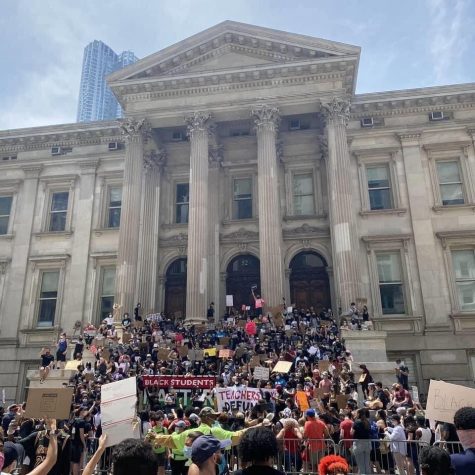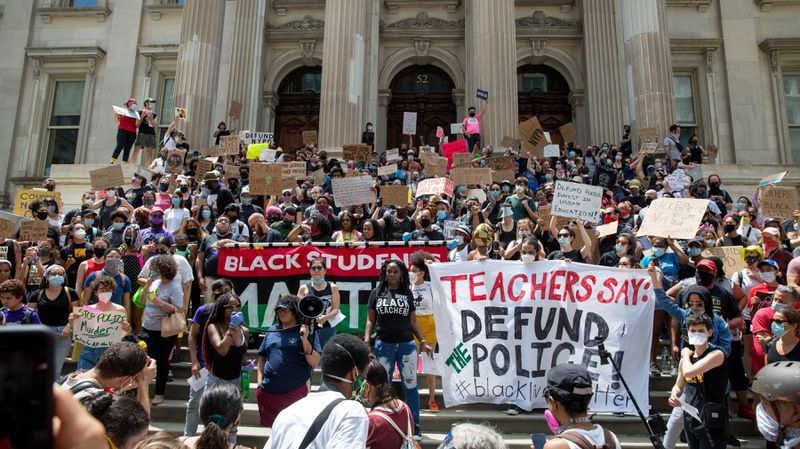George Floyd’s Legacy: The Aftermath of the Derek Chauvin Trial and the Quest for Justice and Racial Reform
The conviction of Derek Chauvin has brought rare repercussions regarding excessive use of force in policing. There are many more steps that all America needs to take in order to rectify the decades of police brutality in Black & Brown communities across America.
Tajh Sutton / Teens Take Charge
The scene at the a Police-free schools rally on June 6th, 2020, which was located blocks away from the African Burial Ground National Monument in Lower Manhattan, New York. Thousands of students, teachers, and parents came together to protest. The rally was also a place to memorialize George Floyd. People spoke about Floyd at the rally and mentioned the legacy he had left us.
On April 20th, 2021, nearly a year after George Floyd’s death, Derek Chauvin was convicted of second-degree murder, third-degree murder, and second-degree manslaughter. As the camera panned back and forth from Mr. Chauvin’s emotionless expression, people cheered outside the Minneapolis courtroom and relief could be felt from all over America.
The conviction marked the end of weeks of trial, filled with powerful and resonant testimony, some from bystanders as young as nine years old. People and reporters were moved to tears. The harrowing video recorded by Darnella Frazier, capturing the tragic final moments of George Floyd’s life, played repeatedly throughout the trial. While being interviewed on CNN, George Floyd’s girlfriend was shaking and in tears, relieved. George Floyd’s immediate family felt the same. Philonise Floyd, George Floyd’s brother, said, “I can finally go to sleep now.” The conviction was significant for many Americans, especially those who were waiting in anxious anticipation to hear the verdict, and while it does not bring George Floyd back to life, it was a step in the right direction.
The outcome felt soothing and celebratory, but many say that it was not a sign of justice; rather, it was merely accountability. Many prominent politicians, such as Alexandria-Ocasio-Cortez, Bernie Sanders, and Stacey Abrams, have said that Mr. Chauvin getting convicted is merely holding the officer responsible for his actions; true justice would happen if George Floyd were still alive. Other politicians made questionable remarks, such as Speaker of the United States House of Representatives Nancy Pelosi. Hours after the conviction, Nancy Pelosi spoke of George Floyd and thanked him for sacrificing his life for justice. Many people perceived that comment to be a tone-deaf statement.
“I think that labeling this verdict as ‘justice’ is harmful, as it feeds into the notion that Chauvin was ‘just a bad apple,’ rather than face the reality which is that the entire police system, if we’re going off the same analogy, is a rotten tree. It’s important to be thankful that Chauvin was found guilty, but not necessarily celebrate the justice system for convicting a murderer, because this action should be expected, not praised,” said Regan Toriello ’23.
But perhaps the situation is not an issue of justice versus accountability. “Moving forward, the conversation can not be about accountability or justice, but rather a striving towards accountability and justice,” said Taybah Alam ’23. “I think we need to be careful with [stating that the conviction of Mr. Chauvin is a form of accountability] to avoid mistakenly lulling ourselves into believing that legal action equals accountability. Chauvin might spend decades of his life in jail, but George Floyd was not even given the chance [to continue living his life],” said Diana Campbell ’22.
Part of the reason the outcome of the trial was monumental was because it was a rare form of punishment for a law enforcement official. “The reason for relief is because people are letting it be be known that you cannot commit heinous acts and expect to get away with it; people will testify against you, people will protest in the streets, and people will force change,” said Alam. There was unequivocal condemnation from the public and from the trial’s jury members, as the members of the jury reached a decision in just ten hours, during deliberations spread out over two days.
However, there have been many times where injustices against Black men have happened from the police, only for the police not to be charged, a jury to acquit them, or for the punishment to be minimal and not fit the crime. This happened in the case of Rodney King, an unarmed Black man beaten by the Los Angeles Police Department in 1992 after trying to avoid arrest. Of the four officers who were tried for the use of excessive force, two were acquitted, and two officers were sentenced with thirty months in a federal correction camp. The officer who shot Oscar Grant on a transit station in California was only found guilty of involuntary manslaughter and served eleven months in prison. Daniel Pantaleo, the officer who placed a lethal chokehold on Eric Garner, was fired from his job but was never charged.
These various instances of how officers experience some form of impunity after they have committed police brutality reveals the cracks in the system. “Until we remove the current system entirely and enforce a new system that does not oppress BIPOC or any individual, real justice will not be served, and we will continue to see to those crimes happen,” said Tiffany Zheng ’23.
Where do we go from here? How do we seal the wounds that have gone so deep from the grave mistakes the country has made in policing? “Nothing will reverse the pain that police officers, specifically the Minneapolis Police Department, have inflicted upon Black communities. We need to get to a space where we no longer expect accountability after a tragedy, rather we should expect that Black people walking down the street do not get knees on their necks or bullets in their backs or their blood on the pavement,” said Campbell. There has been an abnormally high police presence in Black communities for decades, as shown by the stop and frisk statistics, in which the majority of targeted persons are Black. When the War on Crime policy was implemented in the mid 1960s, along with the Safe Streets Act of 1968, law enforcement officials heavily relied on surveilling Black communities in order to reduce crime, which ended up in the mass incarceration of Black people. The path towards true justice involves a transformation in policing.
The legal system in place right now has its shortcomings. “The current system is designed to suppress people of color and allow Caucasian people to suppress BIPOC. In the twenty-first century, we are using a system that is more than 400 years old. The system was enforced when law enforcements got new codes of weapons in the 1970s, when slaves were made out of criminals in 1865, or when the Bill of Rights was signed in 1791,” said Zheng.
In order to transform policing across America, a communal aspect to police may help, where police officers are interacting with their communities and forming familiar bonds with residents. A de-emphasis on the militarization of police is needed. Most importantly, Black lives need to be valued, and momentum needs to be made in order to ensure that police do not resort to the most brutal methods when confronting a person of color.
Fighting for social change does not end with the conviction of Derek Chauvin; there is more that can be done. “People must realize that Black Lives Matter, or advocating for Black people, is not a fad that goes in and out of style; it is an issue that is deeply-rooted in systemic racism that makes ‘human worth’ a topic to debate,” said Alam. “I think the momentum for racial justice can continue if people take individual measures, rather than constantly depend on a bigger movement.”

There is a long way to go, and it is normal to feel overwhelmed, even helpless. Some people feel that they can not cause significant change against mounting injustice. However, there are ways that young people can become involved. “I think that people need to take baby steps. Everybody wants to donate to the organizations and attend the protests and make the signs, before they really take a step back and think about that for which they are fighting. People cannot tackle the racism in the city in which they live, if they are unable to tackle the racism in their heart,” said Campbell. Campbell also recommended thinking about racial justice through a personal perspective. “Something that might help is to avoid thinking of yourself as separate from this issue. George Floyd could have been someone three houses down on your block, someone who sits next to you in class, or someone who works at your favorite restaurant. This work is not about keeping the conversation going; rather, this is about recognizing that what you were not doing before is no longer acceptable — you need to start doing, now.”
Currently, the Minneapolis Police Department is rolling out an investigation that will probe more deeply into controversial police practices such as chokeholds and use of excessive force. The investigation will go into the reasons of why Derek Chauvin was allowed to continue serving in the police department given his questionable policing practices and prior complaints lodged against him. The investigation will give a clearer look into what the Minneapolis Police Department needs to fix so that policing practices become more ethical, fair, and unbiased.
“Nothing will reverse the pain that police officers, specifically the Minneapolis Police Department, have inflicted upon Black communities. We need to get to a space where we no longer expect accountability after a tragedy, rather we should expect that Black people walking down the street do not get knees on their necks or bullets in their backs or their blood on the pavement,” said Diana Campbell. ’22.
Dorothea Dwomoh is an Editor-In-Chief for ‘The Science Survey.’ Dorothea believes that journalism serves as an avenue of truth and she likes that it...

